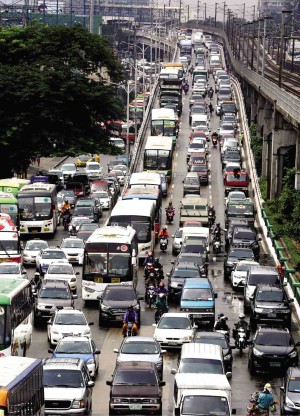Edsa traffic jams: Rody exec eyes extra powers
DAVAO CITY, Philippines—The Duterte administration plans to declare a “traffic crisis” in Mega Manila and seek emergency powers that will address in the next two years what incoming Transportation Secretary Arthur Tugade said was a problem that shamed Filipinos here and abroad.
READ: ‘Give Duterte emergency powers to solve Metro traffic’
On the sidelines of the “Sulong Pilipinas: Hakbang Tungo sa Kaunlaran” meeting between President-elect Rodrigo Duterte’s economic managers and the business community, Tugade said a bill was being drafted by incoming Justice Secretary Vitaliano Aguirre II, Solicitor General Jose Calida and the legal team to be submitted as soon as the 17th Congress opens next month.
Incoming House Speaker Pantaleon Alvarez was receptive to the idea. So was Duterte himself who urged them to study the measure to determine if it was a viable solution to the traffic problem in Metro Manila and nearby areas, Tugade said.
The Philippines loses P2.4 billion per day to traffic, based on estimates of the Japan International Cooperation Agency in 2013.
“We should no longer lose money to traffic,” Tugade said, adding that the incoming administration would also aim for a “dramatic reduction” in queues at airports as well as the Metro Rail Transit (MRT) system.
Article continues after this advertisementTugade said a traffic crisis must be declared and must be acted upon by Congress as daily economic losses could have ballooned to P3 billion.
Article continues after this advertisement‘Bastardized’
“Our quality of life has been bastardized,” he said, pointing out that more hours are spent commuting to and from the workplace.
“If our life has been bastardized and this is not a crisis, what is a crisis?” Tugade said.
“Internationally, the image of the Republic of the Philippines has deteriorated because of transportation and traffic problems,” he added.

MARTIAL LAW IN METRO STREETS? Incoming Transportation Secretary Arthur Tugade announces plans to place Mega Manila under a “traffic crisis” and ask Congress for emergency powers to solve the problem in the next two years. Photo shows the southbound lane of Edsa in Cubao, Quezon City, during rush hour. NIÑO JESUS ORBETA
The additional powers will allow the national government to secure property and right of way within private villages, as well as supersede local government ordinances and temporary injunction against acts that would facilitate lighter traffic flow in the metropolis, he said.
Specifically, terminals of public utility vehicles as well as ambulant vendors will be removed near highways, while a strict no-parking policy will also be implemented along major roads.
Also, the Duterte administration will seek to direct procurement instead of protracted bidding for projects aimed at easing traffic, Tugade said, without elaborating.
He said the powers that the incoming administration sought would neither be confiscatory nor unreasonable, as they would ensure just compensation and relocation for affected entities.
There will also be oversight powers for Congress and the Supreme Court to check on the executive’s additional power to avoid its exercise “capriciously and arbitrarily.”
No implementation
Past administrations have pinpointed solutions to the problems but have not implemented them, Tugade said.
He referred to court injunctions, restraining orders, right of way and concerns of local government units.
He said there were also social issues that had to be dealt with.
Tugade said that under the platform of discipline, everyone should be prepared to sacrifice.
“We have been mired in lack of discipline. We need to raise the level of discipline and to do this, we need to make personal sacrifices,” he said. TVJ
RELATED STORIES
Pitch your solution to Metro traffic and win $1K